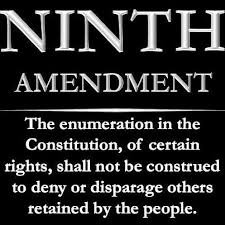The enumeration in the Constitution, of certain rights, shall not be construed to deny or disparage others retained by the people.
The Ninth Amendment was created simply to protect the rights of citizens not explicitly guaranteed by The Constitution; the Tenth Amendment discusses similar topics as both were once one, but then were split when the Bill of Rights was created. A source of much debate, the Ninth Amendment was formed during the creation of The Constitution because many feared that if the rights deemed necessary for man to live free were not stated clearly they would be crushed by the government and that a Bill of Rights was the only way to prevent that. Even in today’s court system, the Ninth Amendment is rarely used and when it is it provides a topic for debate because how far do we go when expressing rights that are not guaranteed by the government? Where do we limit ourselves? What’s more dangerous: a populous that has somewhat of a no restriction zone or a government that overregulates?
A landmark Supreme Court case that dealt with the issues discussed in the Ninth Amendment, was an “oldie but a goodie” Griswold v. Connecticut, which was discussed in relation to the Third Amendment. As a quick review, the case was centered around the defendant, Griswold, who was the Executive Director of the Planned Parenthood League in Connecticut. Both she and another member of the league gave advice to married couples in regard to birth control. Once they were discovered giving these counseling sessions, Griswold and her co-worker were convicted under a Connecticut state specific law that criminalized providing information regarding birth control. Now, when looking at it through the lens of the Ninth Amendment, not the third, which touches upon privacy, Griswold and her co-workers are guaranteed the right to offer these counseling sessions. Now you may be thinking, well they broke a state law, but that does not apply if it took place within their private organization and in a private conversation. The decision in this case, which was a 7-2 decision, established the precedent that together the First, Third, Fourth, and Ninth Amendments created a new level of a right to privacy, especially in a marriage or on private property. And considering this decision took place at the federal level, it outweighs a state decision and follows the provision in the Ninth Amendment that gives citizens the ability to exercise their rights that are not strictly stated by The Constitution.
But this guarantee to practice any rights we see fit, and that are not written clearly in our laws does not hold true for everyone; some citizens still feel neglected and restricted when exercising’s their rights. And that may be an effect of not necessarily the written law, but our society and its cultural norms that may not warrant nor accept certain forms of behavior.
Websites:
https://www.oyez.org/cases/1964/496
https://constitutioncenter.org/interactive-constitution/amendments/amendment-ix



